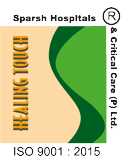Why choose Sparsh Hospitals for Surgical Care?

The Department of Surgery at Sparsh Hospitals offers a wide range of surgical services, utilizing advanced techniques and technology to ensure the best possible outcomes for our patients. Our team of highly skilled surgeons, anesthesiologists, and surgical nurses work together to provide comprehensive care for both elective and emergency surgeries. From minimally invasive procedures to complex surgeries, we are committed to delivering excellence in surgical care with a focus on patient safety and recovery.
What is Surgery?
Surgery is a branch of medicine that involves the use of operative techniques to investigate, treat, or manage various conditions, diseases, and injuries. Surgical procedures can be performed for diagnostic, therapeutic, or palliative purposes. Surgeons are trained to perform operations on different parts of the body, and they specialize in areas such as general surgery, orthopedic surgery, cardiovascular surgery, neurosurgery, and more.

Common Surgical Conditions and Treatments
– Appendicitis: Surgical removal of the inflamed appendix, known as an appendectomy.
– Gallstones: Removal of the gallbladder through a procedure called cholecystectomy.
– Hernias: Repair of hernias using open or laparoscopic techniques to prevent complications.
– Cancer Surgery: Removal of tumors and surrounding tissues to treat various types of cancer.
– Heart Surgery: Procedures such as coronary artery bypass grafting (CABG) and valve replacement to treat heart conditions.
– Joint Replacement: Surgical replacement of damaged joints with artificial implants, commonly performed on hips and knees.
Diagnostic Tests in Surgery
– Blood Tests: Preoperative testing to assess overall health and detect any underlying conditions.
– Imaging Studies: X-rays, CT scans, MRIs, and ultrasounds to visualize internal structures and plan surgeries.
– Biopsy: Collection of tissue samples to diagnose cancer or other diseases.
– Endoscopy: Minimally invasive procedure to examine internal organs and collect tissue samples.
– Electrocardiogram (ECG): Assessment of heart function before surgery.
Surgical Treatments
– Minimally Invasive Surgery: Techniques such as laparoscopy and robotic surgery for faster recovery and less postoperative pain.
– Open Surgery: Traditional surgical approach for complex cases and large tumors.
– Emergency Surgery: Immediate surgical intervention for trauma, acute appendicitis, and other urgent conditions.
– Reconstructive Surgery: Procedures to restore function and appearance after injury or surgery.
– Postoperative Care: Comprehensive care plan including pain management, wound care, and physical therapy to ensure optimal recovery.

